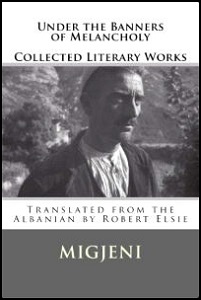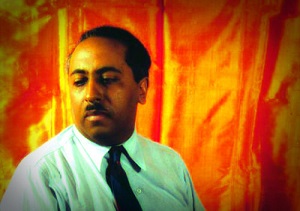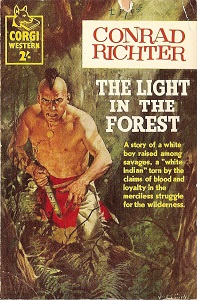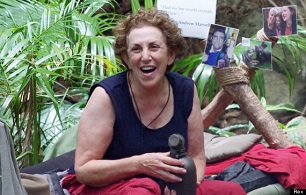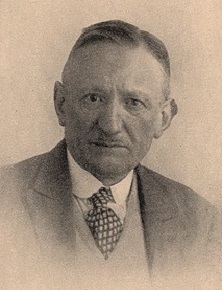Dolce far niente
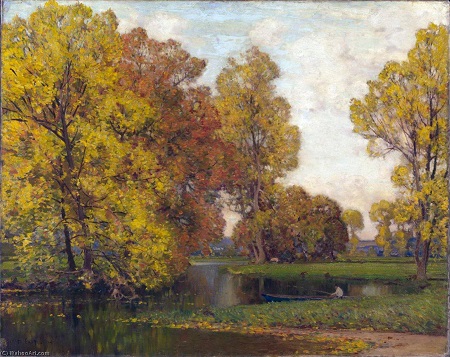
Golden Autumn door Alfred East, 1904
Goldener Vorhang
Ein Vorhang zaudert sich zu heben,
er selbst ist Bühne schönster Art.
Der Birke goldner Hängebart
will sich mit Buchenlaub verweben.
Die Feuertulpenbäume geben
ein Schauspiel vor, das Augen narrt.
Das Blattwerk fällt im Rieselregen,
der Blick zum Szenenbrett wird frei.
Der Landschaft wahres Konterfei
erscheint, blickt überrascht verlegen
dem Wandrerpublikum entgegen.
Die Matinee schließt knapp nach drei.
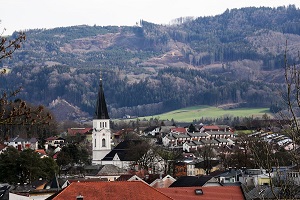
Ingo Baumgartner (24 december 1944 – 16 juli 2015)
Oberndorf an der Salzach, de geboorteplaats van Ingo Baumgartner
De Jamaicaanse schrijver Colin Channer werd geboren op 13 oktober 1963 in Kingston. Zie ook alle tags voor Colin Channer op dit blog.
Mimic
II.
Later, as I pinch out
contact lenses, my own voice comes blah-blah-ing
from behind the mirror mounted
to the bathroom wall.
I smile at Mr. Silly’s talents,
how he switches accents
from Liberian to mine,
hacking vowels,
pitching consonants
precisely in the mouth,
beginning now another improv,
Phone calls from police headquarters
in Gbarnga, begging Kingston
for assistance, tips for getting info
out of infants who
despite receiving torture
still refuse to talk.
In my bed, on light cotton,
ceiling fan on slow,
I miscue the iPod in the dock.
Callas, not Lee Perry, comes on.
In my head I talk to Maki
and myself.
The confessors are clan
to killers on an island
I know. Same nose,
same eyes, same trail of razor
bumping on the shine-
clean cheeks.’ he nicknames
from the news and movies.
Rambo, bin Laden.
The loafers, designer jeans
and polo shirts worn loose.
How they discuss a slaughter
with ease, by rote,
never as something spectacular,
absurd. And I belong to them,
on two sides, for generations,
by blood.
My kinsmen aren’t poets.
They’re cops.
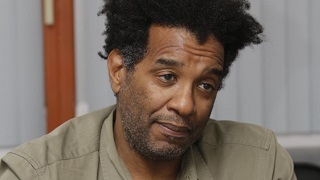
Colin Channer (Kingston, 13 oktober 1963)
De Indiase dichter, schrijver, librettist en muzikant Jeet Thayil werd geboren op 13 oktober 1959 in Kerala. Zie ook alle tags voor Jeet Thavil op dit blog.
Nativism
At 48, the youngest
director in the history of the Civil
Center for Falconry,
Universal Understanding & Aesthetic
Interest,
he published The Spiritual Uses of Oneiric
Travel. It was wartime,
but there’s little trace of conflict
in this odd and beautiful collection
of travel jottings, doodles, and rhyme.
“Everywhere in the old city
there was dread,
a sense of ancient
sympathy,
of inebriated spirits taking the dead,
imperial government
to task, while its citizenry
and civil
servants slept.”
In subsequent decades, he refined his view
of history as the art of the impassable.
He wrote that his goal had been
to be wholly adept
at transference, “a bridge between
thought and its correct
articulation.”
When the government fell he lost his new
stipend, a palpable
loss, and he went home to die.
It was his last
act of secular defiance.
Varanasi, inauspicious
in the new theology, was a dry
tiered place of souls
whose chance on earth had passed,
who concerned themselves
with “a wider world, a suspicious
heritage,
a secure context for the cosmic dance,
a swift descent, a dangerous old age.”
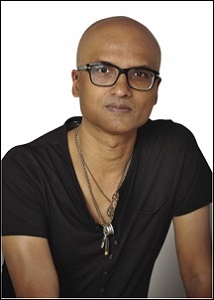
Jeet Thayil (Kerala, 13 oktober 1959)
De Nederlandse schrijver Herman Franke werd geboren op 13 oktober 1948 in Groningen. Zie ook alle tags voor Herman Franke op dit blog.
Uit: De verbeelding
“Ze was nog maar net teruggekeerd uit Napels of ze zocht hem op in zijn nieuwe atelier in Hampstead. Daar stond ze na negen jaar afwezigheid, zijn divine lady, de vrouw met het expressiefste gezicht dat hij ooit had gezien. Hij dacht dat ze een kokette grap maakte toen ze met haar liefste stem vroeg of hij haar wilde portretteren ‘zoals de natuur me gemaakt heeft’. Honderden keren had hij haar geschetst en geschilderd voor haar vertrek naar Italië, maar naakt poseren wilde ze nooit. ‘Mijn beste Romney, dat bewaar ik voor het oog van de liefde,’ was haar vaste antwoord als hij haar op een warme lentedag, of juist midden in een koude winter, toch weer probeerde over te halen, omdat kunst niet van verboden houdt. Maar nu, getrouwd en wel met de Britse oud-ambassadeur in het koninkrijk Napels, lachte ze hem ontwapenend toe en hield haar hoofd smekend schuin toen hij weigerde op haar verzoek in te gaan omdat hij zich te moe voelde en al maanden niets meer gedaan had. Bovendien verlangde ze van het origineel een miniatuur. Ook als hij de tempera-techniek die daarvoor nodig is goed beheerste, zou hij er met zijn onzeker wordende handen niet aan durven beginnen. Vroeger had hij ze wel eens gemaakt met jonge, rustige vingers. Vooral verliefden waren gek op die ovale miniaturen. Ze verwerkten ze in een armband of in een halsketting. Mannen droegen ze op hun hart.van mensen op ware grootte en zelfs daar deinsde hij nu voor terug.
‘Lieve Emma, kijk naar me. Grijs en gerimpeld ben ik. Heb ik het oog van de liefde?’ zei hij.
‘Ach kom, mijn beste vriend, in uw ogen zit meer liefde dan in die van uw jongste collega’s. En u weet het toch? Wijs nooit een mooie vrouw af, want ze zal u altijd haten,’ antwoordde ze en pakte liefdevol zijn arm vast. Hij moest zich beheersen en dat deed pijn, als vanouds. Bij andere vrouwen voelde hij die pijn nooit of hij bracht de beheersing gewoon niet op en omhelsde hen, waartegen ze niet durfden te protesteren. Van kunstenaars tolereerden vrouwen veel meer dan van andere mannen en meer dan ze tolereerden wilde hij niet van ze. Maar Emma had altijd het beest in hem losgemaakt; het beest dat gekooid moest blijven. En dat deed pijn.” Bij de details ging het om precisiewerk waarbij je een loep moest gebruiken. Hij was geen miniaturist, hij was een schilder.”
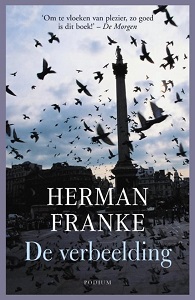
Herman Franke (13 oktober 1946 – 14 augustus 2010)
Cover
De Amerikaanse dichter, literair criticus, essayist en vertaler Richard Joseph Howard werd geboren op 13 oktober 1929 in Cleveland, Ohio. Zie ook alle tags voor Richard Howard op dit blog.
Elementary Principles at Seventy-Two
When we consider the stars
(what else can we do with them?) and even
recognize among them sidereal
father-figures (it was our
consideration that arranged them so),
they will always outshine us, for we change.
When we behold the water
(which cannot be held, for it keeps turning
into itself), that is how we would move—
but water overruns us.
And when we aspire to be clad in fire
(for who would not put on such apparel?)
the flames only pass us by—
it is a way they have of passing through.
But earth is another matter. Ask earth
to take us, the last mother—
one womb we may reassume. Yes indeed,
we can have the earth. Earth will have us.
Compulsive Qualifications
for Stewart Lindh
I
“Richard, May I Ask A Question? What Is An Episteme?”
A body of knowledge. As I know best now,
Regarding yours across the abyss between
That chair and this one,
My ignorance the kind of bliss unlikely
To bridge the furniture without a struggle,
A scene—mad or bad Or just gauche.
The known body is Greek to me,
Though I am said to have conspicuous gifts
As a translator.
More likely the Bible is the right version:
All knowledge was probably gained at first hand
And second nature;
To know the Lord was to be flesh of His flesh.
There was a God, but He has been dismembered;
We are the pieces.
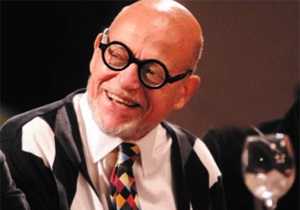
Richard Howard (Cleveland, 13 oktober 1929)
Zie voor nog meer schrijvers van de 13e oktober ook mijn vorige blog van vandaag.


